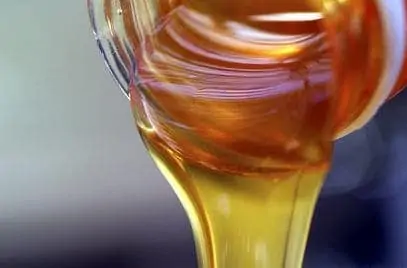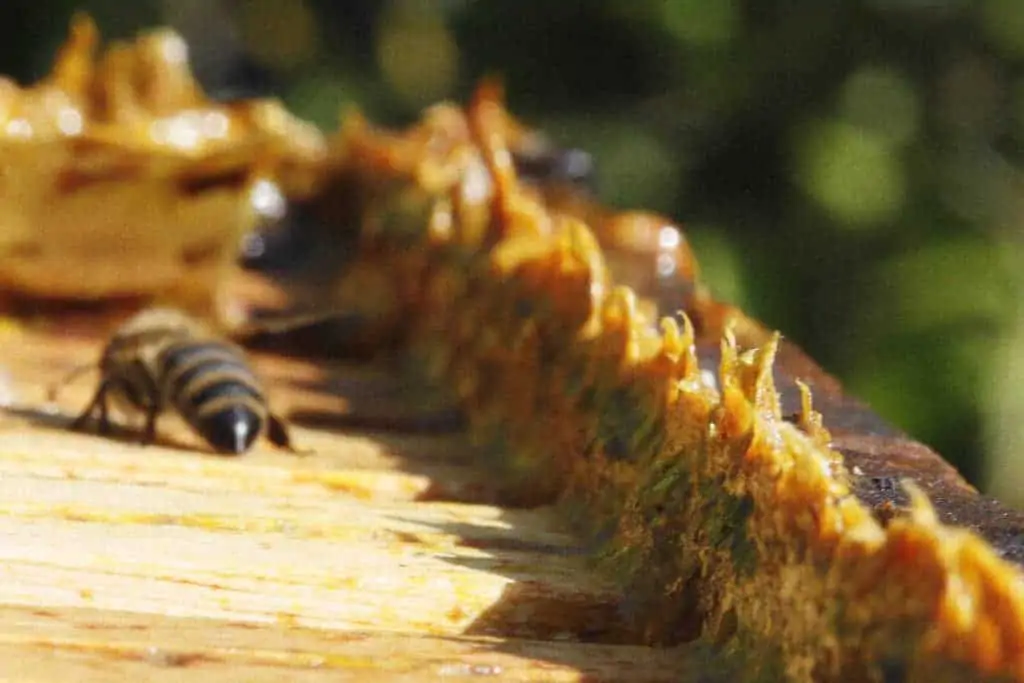Beekeeping, by various definitions, has been around for thousands of years. Pots filled with honey dating back 3,000 years have been discovered in the tombs of the Egyptians, and have been found to be perfectly edible. Ancient civilizations knew there was more to beekeeping than just the honey and used bees in many ways.
While the obvious delights of honey have been recognized for a long time, what are the hidden benefits of beekeeping, those we often don’t consider or realize until we are beekeepers?
Let’s start with the physical resources our bees create and use in the hive.
The Materials of the Hive
Honey
From our perspective, honey is the most obvious material benefit we see from our hives. Yet, it is not just that spoonful of golden sweetness we add to tea or spread on our toast. It is loaded with nutritional and medicinal benefits, many of which have only recently been discovered. Honey contains vitamins, minerals, and amino acids, all of which are necessary for our well-being.

There is also growing evidence of the antibacterial, antiviral, and antifungal benefits of honey for treating a wide variety of health conditions. These include stomach and intestinal disorders, autoimmune conditions, insomnia, and hormone imbalances.
Bee Pollen
Pollen contains nearly all the nutrients needed by humans: protein, amino acids, vitamins, enzymes, fatty acids, and folic acid. Many people consider ingesting local bee pollen as a homeopathic remedy for allergy symptoms caused by blossoming plants in the spring and fall.
Some research suggests that pollen may help maintain liver function and many consider it beneficial in strengthening the immune system.
Propolis
Propolis is the bane of many beekeepers, due to its highly sticky nature. However, it has shown promise in treating various medical conditions in humans. Propolis and its extracts have numerous applications in treating various diseases due to its antiseptic, anti-inflammatory, antioxidant, antibacterial, antimycotic, antifungal, antiulcer, anticancer, and immunomodulatory properties!

Propolis contains important vitamins, such as vitamins B1, B2, B6, C and E, and useful minerals such as magnesium (Mg), calcium (Ca), potassium (K), sodium (Na), copper (Cu), zinc (Zn), manganese (Mn) and iron (Fe).
Enzymes such as succinic dehydrogenase, glucose-6-phosphatase, adenosine triphosphate, and acid phosphatase are also present in propolis.
There is some evidence, with research ongoing, that propolis may be helpful in treating such conditions as swelling (inflammation) and sores inside the mouth (oral mucositis caused by cancer drugs or dentures), gum disease, diabetes, foot sores in people with diabetes, gingivitis, periodontitis, a digestive tract infection that can lead to ulcers (Helicobacter pylori or H. pylori), infection of the intestines by parasites, athlete’s foot, upper airway infections, and warts.
Propolis may also assist in healing wounds, improving immune response, treating infections, lowering inflammation, treating nose and throat cancer, stomach and intestinal disorders, tuberculosis, and ulcers.
Many folks consider propolis a rather remarkable substance!
Pollination
We all understand the benefits of pollination on crops. But we can also thank bees for the diversity of native plants. We recognize their benefits on the local level in our gardens and backyards, for both ourselves and our neighbors.
A higher yield of locally grown produce means lower costs, fresher fruits and vegetables, environmental benefits (due to the reduced transportation costs), and may even improve the local economy. Bees positively impact the health and beauty of our flower gardens and wild plants, creating beautiful places to live, work, and play.
The benefit of bees is not restricted to the immediate area since they pollinate for miles around, spreading diversity and sustainability.
The Beekeeping Community
Bees give us the opportunity to connect with like-minded individuals as well as others with an interest in the environment. We have the opportunity to build a network of friends at the local bee club or garden club. Attending meetings held by your local beekeeper’s association provides the opportunity to bond with others who share your hobby. We also keep informed of the latest information and discoveries, as well as new techniques and products.
Offering to set up a hive or teach members of a gardening club about the benefits of pollination will assist in their efforts to create a beautiful community. It may even get you some great gardening tips in return.
Educating Others and Yourself
You will always have a great conversation starter when meeting new folks who are not beekeepers. Almost everyone, young and old alike, is intrigued by bees. Yet most go about their daily lives without a thought to the life of the bee.
This is an opportunity to dispel the myths surrounding our favorite insect, as we answer a myriad of questions. Sharing details about the hive structure, communication, and capabilities of the bee allows us to pass on our knowledge, especially to the younger generation. Teaching others about beekeeping, whether hands-on or in daily conversation, is one of the greatest pleasures of beekeeping.
When we take the time to bring youngsters with us for a hive inspection, it can be truly awe-inspiring. They will learn about the life cycle of the bee and how the bee interacts with and benefits the world around us. This is an excellent way to get children involved in beekeeping and taking care of the environment.
Continual Learning
Maintaining hives is a continual learning experience, as any beekeeper will tell you. Everyone has to learn the basics of beekeeping to understand the queen and her colony. Every beekeeper has their own management style that will differ slightly from that of others. Being a competent beekeeper means not just working with your bees, but having the ability to assess how new techniques may benefit your colonies and goals.
Once you get in the hive and handle your bees during an inspection, you may find yourself heading in new directions that interest you. Whether it be honey production, raising nucs, queen rearing, pollination services, or the scientific study of bees, there is much to challenge and interest us beyond “just beekeeping”.
Each year with our bees brings new successes, failures, and challenges. The swarm prevention that worked perfectly last year could be a loss this year, as your bees decide to swarm earlier. The management of Varroa could be a success one year and not the next. We must always keep our eyes, ears, and minds open to what the bees are telling us. We are always learning and growing with the colonies we keep.
Looking After You
Stress Reduction
Aside from the fascination of the hobby, beekeeping is a wonderful reliever of stress. Dealing with a hive full of 60,000+ stinging insects may not sound relaxing, at least to the layman. But once you immerse yourself in the world of bees, as you watch the activity of the hive, stress seems to melt away.
Many beekeepers enjoy going out to the hive with a lawn chair, a cold drink in hand, just to watch bees coming and going, as they listen to the happy buzzing. It truly is a hobby in which you can completely lose yourself as you connect with nature.
Programs for Veterans
Beekeeping is used in many social programs to help those dealing with high levels of stress, anxiety, and PTSD. The Heroes to Hives extension program at Michigan State University (MSU), with apiaries all over the state, is a unique way to help military veterans integrate back into civilian life.
Adam Ingrao, the founder of Heroes to Hives, has firsthand experience of the benefits of beekeeping. An army veteran himself, he struggled with opioid abuse for a couple of years. After getting out of the military, he attended a beekeeping class in California, which eventually was life-changing in a very positive way.
Many returning veterans find it hard to fit into everyday working life. Heroes to Hives teaches them that beekeeping may even offer a business opportunity. They are trained in beekeeping, as well as the potential to start a small business.
Veterans are able to learn at their own pace, gaining far more than beekeeping and business skills. They find that mindfulness and focusing on the tasks at hand are crucial to managing a colony. Investing in their own business and developing a management plan for their bees allows them to find purpose, give back to the community, and possibly provide for their families. Through this program, many veterans have been able to find self-healing as they move forward in their new life as civilians.
“Sleeping Above the Bees”
Sleeping above bees or sleeping on beehive beds is best known as ulleotherapy or uleterapia in Russia. It is a common practice in that area of the world, as well as Ukraine, China, Japan, Korea, and Canada. In America, it goes by various names: bee therapy, sleeping above the beehives, and sleeping with bees.
Therapists suggest that many factors combine to provide a state of self-healing of the body. One benefit is the micro-vibration created by bees fanning their wings in order to evaporate the moisture from the nectar. For the person sleeping above the hive, it is like a light vibro-massage, acting positively on the nervous, circulatory, and muscular system, inducing a state of self-healing and balance.
Clean, ionized air (aka ionotherapy) is created in the hive and inhaled by the patient sleeping above. The air comes through a fine mesh screen in the bed portion of the beehives. It is suggested that microbes in bronchi and lungs are killed during ten minutes of inhalation.
Aromatherapy offered by the smell of nectar, honey, and propolis, all create a relaxed atmosphere, inducing sleep in many participants.
Bee buzzing, aka bee humming, induces a mild state of meditative trance and triggers our own self-healing frequency. It has been reported to balance the sympathetic and parasympathetic nervous system, and remove fatigue, stress, and tension. There is complete physical and emotional relaxation, triggering an improved psycho-emotional status of a person.
There have been numerous studies reporting positive effects in rheumatic, dermatological, urology, gynecology, cardiology, endocrinology, and respiratory systems, as well as the musculoskeletal system. Some say it cures chronic diseases, normalizes potency in men, and eliminates insomnia.
As a Creative Outlet
Beekeeping also allows you the opportunity to unleash your creative side. There are many styles of bee suits, often available in colors beyond the traditional white. You can find any style to meet your personal comfort level around the bees. There are veils, jackets, and full suits of all configurations and levels of protection.
Hives can be simply painted white, or decorated to your heart’s desire. Whether just painting them different colors or making them look like actual houses, your bees will be happy taking up residence in the hive!
Why Keep Bees?
For all of the benefits bees provide, beekeeping requires very little work compared to other pets we might keep. It is clearly possible to maintain beehives and work a full-time job. Bees do not need daily walks (which would take a while!), feeding or watering. Many beekeepers find themselves dedicating a relatively short period of time each week to their bees, once the apiary is set up. Of course, honey extraction can take a while, depending on the amount of honey involved and the equipment available. But who will complain when the reward is so sweet?
Beehives do not require acres of property or a large yard. The most common beehive measures 20 by 16 inches, so they do not take up much space themselves. Subject to your local laws, of course, they can be placed in any corner of the yard. As long as there are adequate pollen and nectar resources, bees will happily live in the suburbs, city, or on a farm.
Compared to other hobbies, beekeeping does not need to be an expensive one. That said, it is likely many beekeepers who have found themselves drawn ever more to their bees may well smile at that statement!
As a rough guideline, the first hive complete with boxes, bees, clothing, and basic equipment required, may run around $400 – $500. That said, it is quite feasible to come in well below that, with some judicious shopping decisions. You will, of course, have to purchase a hive for each colony, but much of your equipment will need to be purchased just once. Some examples of these one-time purchases are a smoker and a hive tool.
Buying a starter or hive kit is often a great way to save money. Big ticket items can be purchased once you are sure this is a hobby you are going to maintain. When you take into consideration the start-up cost of other hobbies such as photography, motorcycle riding, mountain climbing, scuba diving, fishing, and camping they often cost far more to get started and continue.
The benefits of beekeeping extend far and wide. We continue to learn more every day, as we work with and study bees. It is a fascinating hobby that will always keep you engaged and full of wonder.
Author
Judi Bogardus, PerfectBee Ambassador

Sources
Beekeeping Insider. (n.d). The Benefits of Keeping Bees
Bee Missionary. (2019). Veterans and Bees.
Cushman, David A. (n.d) Education, Training and Teaching. Help for beekeepers to learn more about the craft.
PMC US National Library of Medicine National Institute of Health. (2017). Honey, Propolis, and Royal Jelly: A Comprehensive Review of Their Biological Actions and Health Benefits
Alexandrovich, Grigory & Teslyuk, Gregory. (2018). Sleeping above beehives – another way of treating ourselves with bees’ help.
David Kumasaka, M.D. (2017). Peak of Health: The health benefits of beekeeping.
WebMD. (n.d) Propolis
Healthline. How nutritious is bee pollen exactly?